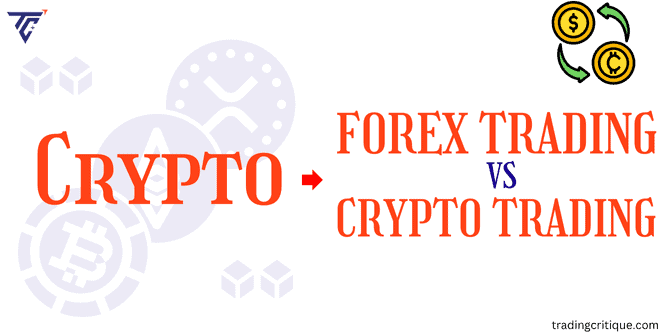Forex or crypto trading: Which is the right investment for you? Both offer opportunities for profit, but they come with different levels of risk and require distinct skill sets. This comprehensive guide will help you understand the key differences between these two markets. It evaluates your risk tolerance and makes an informed investment decision to align with your financial goals.
Quick insights
Forex trading
The foreign exchange market is the largest financial market globally, with trillions of dollars traded daily. Forex traders swap one currency for another. It aims to profit from exchange rate fluctuations.
Crypto trading
Cryptocurrency trading involves buying and selling digital or virtual currencies, such as Bitcoin, Ethereum, and others. Unlike forex, cryptocurrencies operate on a decentralized system known as blockchain technology. This new asset class has shown immense volatility, presenting both significant opportunities and risks.
Key distinctions between forex trading and crypto trading
The key distinctions between forex and crypto trading are as follows.
- Market structure and size
- Volatility and liquidity
- Asset type
- Platform availability and accessibility
- Risk factors
- Influence factors
- Regulation
- Market hours
- Supply and demand
Market structure and size
Forex: It is the largest financial market globally, with trillions of dollars traded daily. The forex market operates as a decentralized over-the-counter (OTC) platform, characterized by its immense size and liquidity.
Crypto: While also decentralized, the cryptocurrency market is significantly smaller in comparison to forex. It operates primarily on blockchain technology and has experienced substantial growth. But its trading volume is still considerably lower.
Volatility and liquidity
Forex: It is characterized by lower volatility due to its high liquidity. The vast trading volume and numerous market participants contribute to price stability. However, significant economic events or geopolitical crises can introduce periods of increased volatility.
Crypto: It is known for its extreme volatility, which is often attributed to its relatively lower liquidity compared to forex. Price swings can be sharp and unpredictable, creating both opportunities and risks for traders.
Asset type
Forex: It primarily involves trading currencies issued by governments, such as the US Dollar, Euro, Pound Sterling, and Japanese Yen.
Crypto: It involves trading digital or virtual currencies. It is often referred to as cryptocurrencies, which are not backed by physical assets or governments such as Bitcoin, Ethereum, and others.
Platform availability and accessibility
Forex: It is more accessible to traders, with a wide range of regulated brokers and trading platforms available. These platforms often offer advanced tools for technical analysis and order execution.
Crypto: While gaining accessibility, the cryptocurrency market can still present challenges. Setting up a digital wallet and finding a reputable exchange might require more technical knowledge. The range of trading platforms can be vast, with varying levels of security and reliability.
Risk factors
Forex: While regulated, forex trading involves inherent risks such as market risk, liquidity risk, counterparty risk, and operational risk. Leverage though amplifying potential profits, also magnifies potential losses.
Crypto: It has a considerably higher risk profile due to its volatility, market immaturity, and regulatory uncertainty. In addition to market, liquidity, and operational risks, crypto traders face unique risks like hacking, fraud, and the potential for complete loss of funds.
Influence factors
Forex: It is primarily influenced by macroeconomic factors such as central bank policies, interest rates, economic indicators, geopolitical events, and market sentiment.
Crypto: It is influenced by a combination of factors including market sentiment, technological advancements, regulatory changes, and the actions of large investors.
Regulation
Forex: The forex market is heavily regulated by financial authorities in most countries. These regulations are designed to protect investors, maintain market fairness, and prevent fraud.
Crypto: In contrast, the crypto market is largely unregulated or lightly regulated in many jurisdictions. Investors face greater risks due to fewer protections. If something goes wrong, like a scam or hacking, it is harder to get help or get your money back.
Market hours
Forex: The forex market operates 24 hours a day, five days a week. This non-stop trading is due to the overlapping trading sessions of major financial centers around the world.
Crypto: Most cryptocurrency markets operate 24/7, providing traders with continuous access to buy and sell digital assets. This round-the-clock availability is a key distinction from traditional financial markets like forex.
Supply and demand
Forex: Forex prices are determined by currency supply and demand. Economic factors like interest rates, political stability, and GDP influence these factors.
Crypto: Crypto prices are highly volatile due to supply and demand fluctuations. Market sentiment, technology, and limited supply often drive rapid price changes.
Forex vs crypto trading: Which is better for you?
Forex tradinginvolves dealing with traditional currencies in a highly regulated market. It offers trading established currency pairings like USD/EUR (US Dollar vs. Euro) and is generally less volatile. It provides a more stable trading environment. Generally, less volatile, making it suitable for risk-averse investors seeking stable returns.
Cryptocurrency trading is characterized by extreme price movements and operates in a largely unregulated space. While it offers the potential for high returns, it also comes with significantly higher risks. It is suitable for risk-tolerant investors who are comfortable with market volatility and willing to conduct in-depth research. Check here to know, is cryptocurrency a safe investment?
Finally, the choice between forex and crypto trading depends on an individual’s risk tolerance, investment goals, and understanding of the markets.
Conclusion
Choosing between forex and crypto trading depends on your risk tolerance, trading experiences, and investment goals. Forex offers stability with established currencies and regulations. It is suitable for risk-averse investors seeking consistent returns.
Cryptocurrency trading presents opportunities for high returns but comes with significantly higher risks due to its volatility and lack of regulation. It is essential to conduct thorough research, develop a solid trading strategy, and consider using risk management tools before investing in either market. Diversification across different asset classes can also help manage overall portfolio risk.
Pro Tip
Empower your financial journey with trusted forex brokers. Open an account today and gain access to secure trading platforms and expert guidance. Explore diverse investment opportunities including stocks, bonds, mutual funds, forex, and cryptocurrencies.
Frequently asked questions
1. Can you trade crypto like forex?
Yes, cryptocurrencies can be traded similarly to forex. Both involve trading one asset against another, to profit from price fluctuations. However, there are key differences in terms of underlying assets, market structure, and regulations.
2. Is forex or crypto easier to trade?
Forex is considered easier to trade than crypto. This is primarily due to its market maturity, regulation, and volatility.
3. Is forex more profitable than crypto?
Factors influence profitability in both forex and crypto, including market conditions, trading strategy, risk management, and individual trader skills. Ultimately, the most profitable market for an individual depends on their trading approach and risk tolerance.







